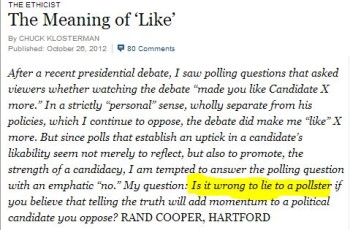
(Credit: NYT, screenshot, highlight added)
“Is it wrong to lie to a pollster,” a reader recently asked New York Times columnist Chuck Klosterman, who writes under the title, The Ethicist, “if you believe that telling the truth will add momentum to a political candidate you oppose?” Klosterman’s answer: “You should not provide false information.”
Of course, how could he say otherwise and maintain his professional status as a guardian of public virtue? After all, his column is not called the Machiavellianist.
There are, as you might suspect, many people who disagree with this judgment, who argue instead that it’s not only ethical to lie to pollsters, it’s necessary and even patriotic. That was the position of the late Donella (“Dana”) Meadows, an environmental scientist of worldwide renown, who got fed up with a political system and the “schemes of the manipulators who are spending a million dollars a week … to lie to me. How come it took me so long to think of lying back to them?” Her decision: “Lying to the pollsters is the easiest way I can see to twit the system. Only takes a minute. They come asking for it.”
There are others who also tell us to “do your patriotic duty and lie when that pollster calls.” That is most often the refrain when the polls are producing information people don’t like about a particular issue.
In fact, if you happen to agree with this advice, you can purchase all sorts of products (hats, T-shirts, buttons) imprinted with the slogan, “Lie to Pollsters.” If you are worried that some in your household will not get the message, you can even buy clothes and other products for your children and pets. That’ll be the last time your cat tells the truth to a pollster, by golly! And if you have an evangelical strain in you, feel free to spring for a bumper sticker, “Rescue Democracy: Lie to Pollsters.” Who could get mad at you for that?
Saving democracy was the theme of Arianna Huffington’s Partnership for a Poll Free America, launched in 1996 with her colleague Harry Shearer, which was an appeal to all Americans not to talk with pollsters at all. As she wrote then, “Polls are polluting our political environment, and there is an urgent need to clean it up…for the good of the American republic, we need to make answering pollsters’ questions déclassé.” But she added, “For those not ready to quit cold turkey, an intermediary stage could be making up answers.”
Yes. If you can’t refrain from speaking to pollsters, be sure to lie. It’s kind of like what our parents told us about keeping quiet if we had nothing positive to say. Same idea. Sort of. Only in reverse.
In 2008, Huffington was still on the warpath against polls, issuing a new “Call to Action” to her HuffPost readers: “Say ‘No’ to Pollsters!” Referring to her 1996 launch of the Partnership effort, she wrote: “In the dozen years since then, the problems caused by polling have only gotten worse.” She urged her readers to sign the “Say No to Pollsters” petition, and to remember: “Friends don’t let friends talk to pollsters.”
Then, in 2010, she caved.
Huffington Post bought out Pollster.com, a website devoted to collecting and analyzing poll data. Somehow, the pollution of polls had given way to, yes, the financial exigencies of running an online publication.
As she explained to the New York Times:
“It’s going to beef up our political coverage…Polling, whether we like it or not, is a big part of how we communicate about politics. And with this, we’ll be able to do it in a deeper way. We’ll be able to both aggregate polls, point out the limitations of them and demand more transparency.”
There’s a lesson in Huffington’s capitulation to the polling industry. It’s too big to fight. Lying to pollsters or refusing to talk with them won’t make a scintilla of difference to the polls. If you don’t talk, someone else will. If you lie, you’re only one of probably 1,000 or so respondents in that survey, anyway, and the other 999 will probably tell the truth, in so far as they understand it.
Of course, pollsters recognize that on issues of “social desirability” – issues that can make respondents look bad if they give one kind of answer – respondents do, at the very least, shade the truth, if not lie outright. Close to nine out of ten respondents in a poll, for example, say they will vote in the presidential election – but turnout figures show that only about half actually do. Trying to correct for this “misrepresentation” of their intentions is why pollsters develop likely voter models. And on other issues, people may trim their answers to make themselves look good in the eyes of the interviewers. Like over-reporting of voting, such behavior is typically predictable and pollsters can adjust.
But that kind of shading the truth is not what Huffington and others were talking about. They wanted us all to lie in ways that would confuse the pollsters and make their polls meaningless. The fact is, as Huffington discovered, that’s simply an impossible action to organize and execute.
It’s reassuring to read that for some people, their ethics are so sensitive that they wonder whether it’s wrong to lie to a pollster. The truth is, it wouldn’t matter.






Comments Terms and Conditions